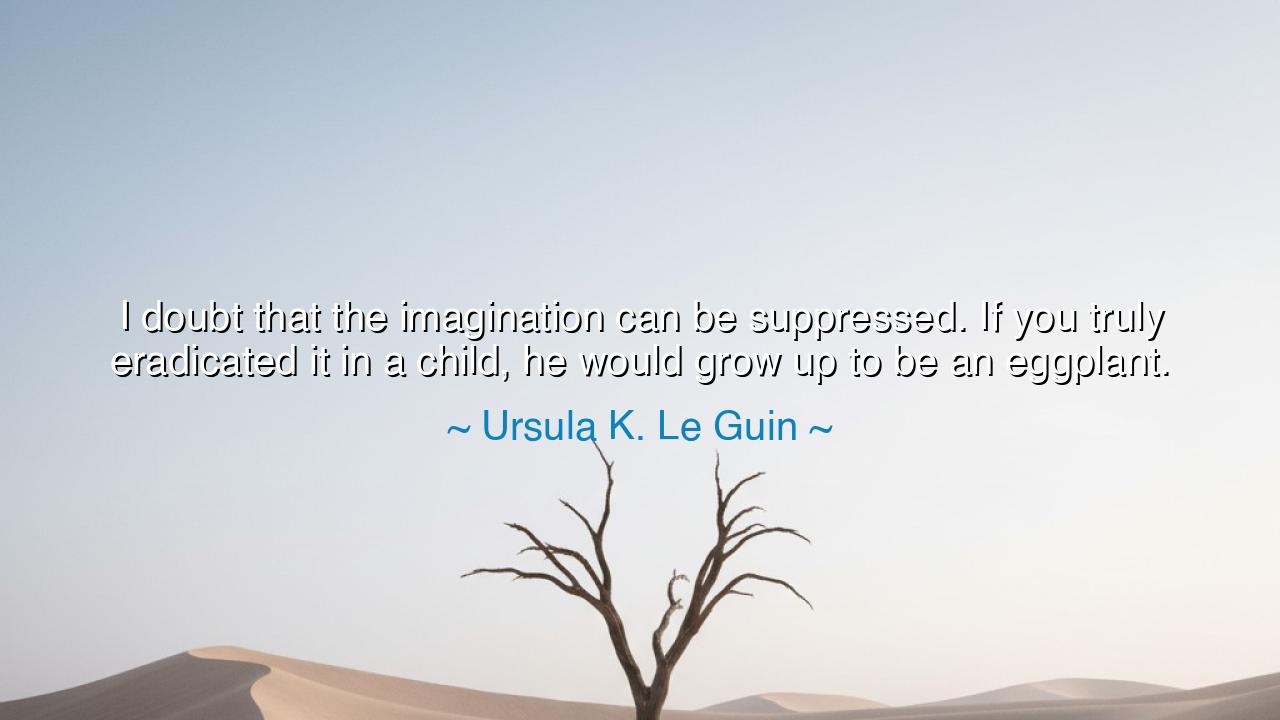
I doubt that the imagination can be suppressed. If you truly
I doubt that the imagination can be suppressed. If you truly eradicated it in a child, he would grow up to be an eggplant.






“I doubt that the imagination can be suppressed. If you truly eradicated it in a child, he would grow up to be an eggplant.” Thus spoke Ursula K. Le Guin, the great weaver of worlds, whose stories carried the wisdom of both myth and truth. Her words, though cloaked in humor, hold a power both tender and profound. In them lies a warning and a celebration — a defense of the imagination, that sacred flame which burns in the heart of every human being. Le Guin, like the philosophers of old, knew that imagination is not mere fantasy; it is the breath of the soul, the very pulse of consciousness. To destroy it, she said, would be to destroy what makes us alive.
The origin of this saying can be traced to Le Guin’s lifelong meditation on the role of creativity in human existence. In her novels — A Wizard of Earthsea, The Dispossessed, The Left Hand of Darkness — she showed again and again that imagination is the foundation of empathy, growth, and freedom. To imagine is to step beyond the self, to see through other eyes, to shape new worlds out of old. Thus, when she speaks of “suppressing” imagination, she speaks of the gravest violence one can commit against the spirit. For what is a child without imagination but a body without wonder — a heart that beats but does not dream?
Le Guin’s jest about the eggplant is no idle whimsy. It is the wit of a sage disguised in laughter. The eggplant, fixed in its place, incapable of movement or thought, symbolizes what the human becomes when stripped of imagination: a creature of habit and instinct, alive but not truly living. For the imagination is what allows the mind to grow, to explore, to question — it is the force that transforms existence into experience. When a child dreams, he rehearses the creation of worlds. When he imagines, he learns compassion, for he becomes what he is not. To eradicate this gift is to petrify the spirit — to turn life into a static thing.
Consider the story of Helen Keller, born into silence and darkness. The world sought to define her by her limits, yet her imagination refused to be confined. Through the guidance of her teacher, Anne Sullivan, Helen awakened not only to knowledge but to vision — the power to see with the mind’s eye. She dreamed of the sea before she ever felt it, and of words before she ever heard them. It was her imagination, not her senses, that first freed her. Had it been “eradicated,” as Le Guin warns, she would have remained a shadow among the living. Instead, she became a voice for millions, proving that the human spirit cannot be reduced to circumstance.
But the world, ever fearful of freedom, often seeks to suppress imagination — especially in its children. Schools may prize obedience over curiosity; societies may reward conformity over creation. We tell our young not to dream too wildly, not to question too deeply, not to wander too far. Yet every time we do so, we dim a little of that eternal fire within them. Le Guin’s words strike at this error with gentle fierceness: she reminds us that to raise a child without imagination is to raise a being who cannot see beyond the visible, who cannot hope beyond the known. Such a one, she says, is no human being — only an “eggplant,” rooted, inert, unawake.
For Le Guin understood that imagination is the wellspring of all progress and all compassion. It is what makes art possible, but also what makes love possible. To love another person is to imagine their world as your own. To invent, to heal, to forgive — all these acts begin in imagination. It is the power by which humanity transcends the cruelty of the moment and envisions a greater good. Even reason, that proud construct of the mind, is powerless without imagination to guide it. A civilization that loses its imagination becomes clever but soulless — rich in machines but poor in meaning.
So, dear listener, take Le Guin’s words as both a warning and a call. Protect the imagination, in yourself and in others. Nurture it as you would a sacred garden — through stories, through wonder, through the courage to dream. If you are a parent, let your child build castles from shadows and turn sticks into swords. If you are weary, let yourself imagine still — for imagination is the fountain of renewal. Do not trade it for comfort, nor smother it beneath routine. For when the imagination dies, humanity becomes mere flesh that moves and eats, but does not become. To imagine is to live. To live without it is to turn slowly into the very thing Le Guin warned of — rooted, motionless, and without spirit.
Thus, remember her truth: the imagination cannot truly be killed, for it is the soul’s own voice. But it can be silenced, starved, forgotten — and then the world grows gray. Feed it, tend it, awaken it. For in the end, it is imagination that lifts us from the dust of the earth and reminds us that we are not eggplants, but creators — beings born to dream the universe anew.






AAdministratorAdministrator
Welcome, honored guests. Please leave a comment, we will respond soon